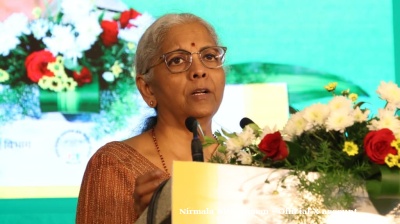Kazakhstan’s government is relying too heavily on a national rainy-day fund to cover operating deficits, increasing the country’s exposure to risks that could cause an economic shock. To mitigate against those risks, the International Monetary Fund (IMF) is recommending that Astana establish an independent fiscal council, along with more stringent policy guidelines, to “limit discretionary spending”.
The recommendations are contained in the IMF’s Final Statement of its 2024 Article IV Consultation Mission, issued in early October. While National Fund reserves have always been used to finance government projects, the use of reserve funds is occurring on a “larger scale” now than in the past, Nicolas Blanchet, the leader of the IMF mission to Kazakhstan, told journalists. He added that it is difficult to track how some of the National Fund money is being spent. “Some operations are completely unexpected, information about them is not revealed,” he said.
The Kazakh government’s reliance on the National Fund, according to the IMF statement, fuels inflationary tendencies. “Inadequate budget planning and lower-than-expected tax revenues in recent years have had a negative impact on the government’s commitment to fiscal consolidation,” according to the statement.
So far in 2024, the government has already drawn down more than 4 trillion tenge ($8.17bn) from the National Fund. It plans to use another 2 trillion ($4.08bn) by the end of the year. Total projected withdrawals for 2024 – 6 trillion tenge (about $13bn at an average annual exchange rate) – would far exceed the target set at the outset of the year – 3.6 trillion tenge ($7.35bn). The volume of withdrawals in 2023 amounted to 5.3 trillion tenge, roughly 20% of the annual national budget.
At one point, the government aimed to increase National Fund assets to $100bn by 2030. That goal now seems unattainable. According to the economic monitoring agency Ranking.kz, the assets of the National Fund have been steadily decreasing since August 2014, when the fund achieved its peak value of $77bn. These days, the fund has less than $63bn in assets.
The need to respond to natural disasters and unanticipated events in recent years, such as the covid pandemic in 2020 and massive flooding in northern Kazakhstan this past spring, have amounted to a major source of pressure on the treasury. As a result, state expenditures have been far outpacing revenue. Dipping into the National Fund has allowed authorities to avoid making difficult budgetary decisions.
The IMF recommended a variety of measures to help the Kazakh government bring state spending more into line with revenue, including better macroeconomic forecasting, tax reform and the development of a comprehensive climate policy to “help reduce the current high level of carbon emissions.”
“The introduction of the new tax code opens up wide opportunities to increase non-oil revenues, including through the abolition of distorting tax incentives and an increase in the value-added tax rate,” the IMF said in its end-of-mission statement.
Some Kazakh analysts dispute the need to reduce National Fund expenditures. “We need money now – we need to build roads, modernise the infrastructure and, in general, bring order to the country,” economist Denis Krivosheev told Eurasianet. “And future generations will take care of themselves.”
Murat Temirkhanov, an advisor to the chairman at the investment company Halyk Finance, generally agreed with the IMF’s assessment. A top priority should be improvements in strategic planning, he said, adding that the government is presently pursuing a variety of costly initiatives without having a well-developed idea of how they will pay off.
“If in the future we see a significant drop in world oil prices, and as a consequence, a deterioration of the [domestic] economy, and there is not enough money in the National Fund, we will have big problems,” Temirkhanov told Eurasianet.
Almaz Kumenov is an Almaty-based journalist.
This article first appeared on Eurasianet here.
News

India’s finance minister to miss upcoming IMF and World Bank meetings
India’s Finance Minister Nirmala Sitharaman will not attend this week’s annual meetings of the International Monetary Fund and World Bank in Washington, as trade negotiations between New Delhi and Washington remain unresolved.

Young Ukrainians asylum seekers fleeing the war for Germany surges
The number of young Ukrainian fleeing the war and seeking asylum in Germany has surged, following Ukraine’s decision to partially lift its travel ban for men aged 18 to 22, according to figures from the German Interior Ministry.

US may double support for Argentina to $40bn conditional on policy reforms
Washington buys Argentine pesos and mulls creating a new private sector-led $20bn debt facility, which would bring total support to $40bn with the existing swap line, Treasury Secretary Bessent said.

Malaysia plans social media ban for children under 13, following Singapore's lead
Under Kuala Lumpur’s proposal, all social media platforms will be required to implement mandatory identity verification systems to prevent underage users from creating accounts.




